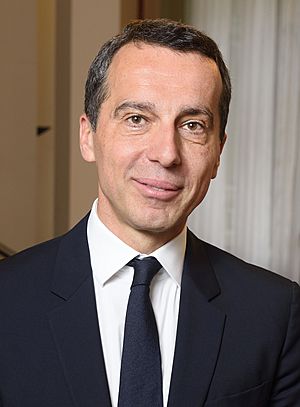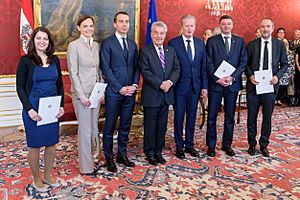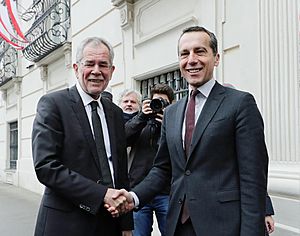Christian Kern facts for kids
Quick facts for kids
Christian Kern
|
|
|---|---|

Kern in 2016
|
|
| Chancellor of Austria | |
| In office 17 May 2016 – 18 December 2017 |
|
| President | Heinz Fischer Alexander Van der Bellen |
| Vice-Chancellor | Reinhold Mitterlehner Wolfgang Brandstetter |
| Preceded by | Werner Faymann |
| Succeeded by | Sebastian Kurz |
| Chair of the Social Democratic Party | |
| In office 25 June 2016 – 25 September 2018 |
|
| Preceded by | Werner Faymann |
| Succeeded by | Pamela Rendi-Wagner |
| Member of the National Council | |
| In office 9 November 2017 – 15 November 2018 |
|
| Nominated by | Himself |
| Affiliation | Social Democratic Party |
| Chair of the Austrian Federal Railways | |
| In office 7 June 2010 – 17 May 2016 |
|
| Preceded by | Martin Huber |
| Succeeded by | Andreas Matthä |
| Personal details | |
| Born |
Christian Kern
4 January 1966 Vienna, Austria |
| Political party | Social Democratic Party |
| Spouses | Eveline Steinberger Karin Wessely
(m. 1985; div. 1988) |
| Children | 4 |
| Alma mater | University of Vienna |
| Profession |
|
| Website |
|
Christian Kern (born 4 January 1966) is an Austrian businessman and former politician. He served as the Chancellor of Austria from May 2016 to December 2017. He was also the leader of the Social Democratic Party from June 2016 to September 2018.
Before becoming a top politician, Kern worked as a business journalist. He then became a senior manager at Austria's main electricity company, Verbund AG. In 2010, he became the CEO of the Austrian Federal Railways (ÖBB), which is owned by the state. He also led a group of European railway companies.
Kern became Chancellor after the previous leader, Werner Faymann, resigned. Kern promised to work with the other main party, the People's Party. He wanted to create a "New Deal" for Austria. This plan aimed to create more jobs by making rules simpler and ensuring workers shared in the country's economic success.
Contents
Early Life and Education
Christian Kern grew up in Simmering, a working-class area in Vienna, Austria. His father was an electrician and his mother was a secretary.
He studied journalism and communication at the University of Vienna. He also continued his education at the Management Zentrum St. Gallen.
Career Highlights
Kern started his career in 1989 as a business journalist. He wrote for a news service and a business magazine. In 1991, he began working for the government. He was an assistant to a state secretary in the Federal Chancellery.
Later, he became the chief of staff and spokesperson for the leader of the Social Democratic Party in parliament. In 1997, Kern joined Verbund AG, Austria's largest electricity supplier. He managed marketing and sales there. By 2007, he was on the company's Board of Directors.
Leading the Austrian Federal Railways
In 2010, Christian Kern was chosen to be the CEO of the Austrian Federal Railways (ÖBB). This is Austria's national train company. In 2014, he also became the chairman of the Community of European Railway and Infrastructure Companies (CER). This group brings together railway companies across Europe.
In 2012, ÖBB celebrated 175 years since the first railway in Austria. Kern opened an exhibition called "The Suppressed Years – Railway and National Socialism in Austria 1938–1945." This exhibition showed the company's involvement during a very dark period in history. Kern said it was "the darkest part of our company's history." He believed it was important to remember and learn from the past. The exhibition later traveled to the European Parliament in Brussels. For his efforts in addressing this history, Kern received an award in 2013.
During the 2015 European migrant crisis, ÖBB helped transport many migrants across Austria. Kern supported German Chancellor Angela Merkel's approach to migration. A leader of the ÖBB workers' union praised Kern. He said Kern was the first ÖBB boss who truly supported his employees.
Becoming Chancellor of Austria


For a few years, people often mentioned Kern as a possible future Chancellor. In May 2016, Chancellor Werner Faymann resigned. The Social Democrats then decided to nominate Kern for the top job.
Kern was sworn in as Chancellor on 17 May 2016. He said he wanted the government to work together better. He also stated that Austria was right to help people during the refugee crisis. He believed it was important to help those in need while also keeping order and safety.
Kern appointed Muna Duzdar as a state secretary. She was the first Muslim person to hold a government position in Austria.
In August 2016, Kern said he was against Turkey joining the European Union. His government also put in place some new rules. These included a ban on face-covering veils and stricter immigration rules.
In June 2017, Kern criticized new U.S. sanctions against Russia. These sanctions could affect energy projects between Europe and Russia. Kern and Germany's foreign minister said that Europe's energy supply was a matter for Europe, not the United States.
In the October 2017 election, Kern's party lost to Sebastian Kurz's party. Kurz then formed a new government. Kern became the leader of the opposition.
Leaving Politics
In September 2018, Kern announced he would step down as the national party leader. He planned to run for the European Parliament. However, in October 2018, he decided to leave politics completely. Pamela Rendi-Wagner became the new party leader.
Other Activities
After leaving politics, Christian Kern joined the board of directors for Russian Railways (from 2019 to 2022). He also became the President of the European China Business Council in 2019. He is also involved with other non-profit organizations and sports clubs.
Personal Life
Christian Kern has four children. He was married to Karin Wessely from 1985 to 1988. She was also a local politician. She spoke highly of him when he was nominated as Chancellor. Kern later married Eveline Steinberger, and they have a daughter. This marriage ended in 2022.
See also
 In Spanish: Christian Kern para niños
In Spanish: Christian Kern para niños
 | Calvin Brent |
 | Walter T. Bailey |
 | Martha Cassell Thompson |
 | Alberta Jeannette Cassell |

